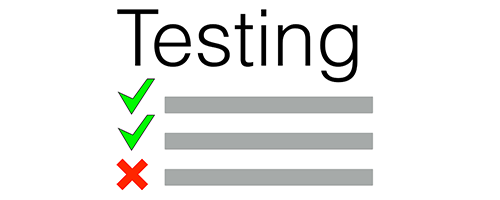By Liz Jones
 Sometimes a prospective client will ask you to complete a test, either in competition with other editors for one ongoing editorial position, or for admission to their pool of regular freelance editors. Opinion is divided among editors about the usefulness and ethics of these tests. Should we be required to take them? Is it something of an insult if we can otherwise demonstrate that we have the necessary experience and skills? And is it a waste of our valuable time … or is there perhaps more to it than that?
Sometimes a prospective client will ask you to complete a test, either in competition with other editors for one ongoing editorial position, or for admission to their pool of regular freelance editors. Opinion is divided among editors about the usefulness and ethics of these tests. Should we be required to take them? Is it something of an insult if we can otherwise demonstrate that we have the necessary experience and skills? And is it a waste of our valuable time … or is there perhaps more to it than that?
Although I am rarely required to take tests for clients (most of my work is repeat business or comes via recommendations), I am sometimes asked to complete one if the client is completely unknown to me, or if the work requires particular skills that can only be seen in action.
For instance, I recently completed a test for a client I had approached about an ongoing copy-editing position. It turned out to be quite a palaver – the test itself was absolutely reasonable (in fact I thought it was a very good test), but to be able to complete it I had to install the latest version of InDesign (until that point I was deluded enough to believe that I had the latest version). This, it turned out, also entailed updating my entire operating system. I also needed to buy the Kindle edition of a well-known style guide, and do my best to absorb the relevant parts of it in the time available. Finally, I had to learn a few new ways of using my freshly updated software in order to complete the test.
Was it worth it? Well, I hope it secures me the work, but even if it doesn’t on this occasion, I don’t begrudge the time I spent. Here’s why.
Benefits of taking tests
As I hope I have just demonstrated, taking a test for a client can be a very useful form of CPD. I certainly learnt things, many of them about software that I have been using regularly for the last ten years, and I have a shiny new operating system. It was interesting to work on a particular type of material, some aspects of which were a departure for me. I also learnt aspects of a style guide that is new to me – though it reminded me very much of one that I already knew, which helped. Above all, the thought of someone looking critically at each and every editorial decision I made focused my mind on trying to get it just right. In an ideal world I would approach every job with this level of intensity.
Aside from the CPD aspect, editorial tests can be a great way in for new freelance editors. If people ask me about the best way to find work when starting out, I often recommend that they seek out clients who require them to do tests. If you get as far as taking the test, and pass it, this can negate the need to provide a long list of experience, which can obviously be a barrier for those new to the profession.
When to be wary
Personally, I wouldn’t be happy to take a test for every prospective client. I would rather know as far as possible that I definitely want to work for the client before putting in the time required to do a test properly. There’s also a limit to how long I am prepared to spend on a test. A length of a thousand or so words is OK. Ten thousand words is too long, in my opinion. I don’t think a reasonable client would ask me to take a test that took up more than an hour of my time.
Finally, I would want to be sure that the test is a genuine test. This has not happened to me (probably because of the nature of my client base), but I am aware that some editors have been sent a section of a longer work as a test … only to discover that others they know have been sent different sections. One suspects that some unethical authors might think it possible to get an entire work edited for free in this way.
How to approach a test
Not everyone likes tests, but there are ways to make them less painful. Take your time to read the instructions provided. It’s clear that if you ignore these, you won’t impress, but more than that – the instructions can provide valuable clues about what the client wants. Are there specific points of style mentioned? Do they want you to provide an idea of the time the test took to complete? Do they want you to quote for the work?
It helps to become as familiar as you can in a short space of time with the existing output of the client. Do they have similar material published on the web? If they do, this is incredibly useful in terms of understanding the tone to aim for when editing; it can also solve a few style riddles.
Finally, try to forget you are doing a test. Easier said than done, I know. But once you get into the rhythm of the work, try to enjoy it and just do the best job you can – as if you were editing for your favourite client, on a topic you find fascinating, at a fabulous hourly rate, on a really good day. You probably won’t achieve this state of being until the end of the extract (especially if it’s only a thousand words long).
For this reason, and others, do check over your work again at the end. And again. I don’t always read things multiple times when I edit in real life – it depends on the parameters of the job – but for a test, I certainly will. This is your one chance; try not to blow it. You’ll probably find that the first half of the test piece is not as good as the second, and can be tightened up no end with another pass.
What to take away?
Well, of course, you hope you get the gig. But whether you do or not, I hope I have shown that a test can be a positive and useful experience in various other ways, too.
 Liz Jones (www.ljed.co.uk) has worked as an editor in the publishing industry since 1998, and has been freelance since 2008. She specialises in trade non-fiction and educational publishing, and is an Advanced Professional Member of the CIEP.
Liz Jones (www.ljed.co.uk) has worked as an editor in the publishing industry since 1998, and has been freelance since 2008. She specialises in trade non-fiction and educational publishing, and is an Advanced Professional Member of the CIEP.
Proofread by Sandra Rawlin.
The views expressed here do not necessarily reflect those of the CIEP.

Great post! I’m taking a test right now and definitely see this particular one as CPD. I’m going to take my time and do my best as I’d really like to add this client to my list! However, whatever the outcome, I will have learnt a lot. Wish me luck!
Thanks, Natalie, and good luck with yours!
Maybe my comments below in a similar discussion among the STET group in Linked In will contribute to the SfEP debate. Two other points first: a) I agree with Liz’s warning re unethical authors, something I only allude to below; and b) I’ve since had to do a cognitive test, eg deducing the next shape or number in a sequence. Now, that seems irrelevant to the proofreading job I was applying for, though no doubt of merit for some posts within the computer software company concerned. So beware of unrelated standard tests set by some companies. To the STET comments…
I see no reason why someone should fear editing tests before being taken on.
They could well broaden your experience with unfamiliar material, methods of working and use of software, which can only add to your set of skills, as well as hone up existing ones. That equates to good practice and, all being well, is a confidence booster.
Such tests should also give you an idea if you’ll enjoy working with a potential employer, which could be very useful if the answer turns out to be ‘no’ as that would avoid a lot of heartache later on.
One assumes the companies sending out these tests use standard material so they can better compare and contrast candidates’ efforts, and allow any fresh, original insights from a candidate to stand out more. That was certainly my experience when I hired people and set such tests.
As for some of my experiences now that I’m on the receiving end of them, in one case I came across a company which generally only hires Oxbridge/Ivy League graduates. That rules me out, and a lot of highly qualified and experienced colleagues I’ve worked alongside over the years. In another case, I encountered horrible software which I’d never want to use again if I can help it. So that test saved me a lot of future hassle; you could say it was a positive negative.
In short, surely taking editing tests is positive. For even if you don’t land or want that job, you’ve built up and broadened your experience for the next opportunity.
Thanks very much for your comments, Steve. It’s interesting to hear of your experience from the other side, too, when you have set tests for candidates.
I wasn’t aware of the discussion on LinkedIn (I wasn’t a member of that group, though I am now!). It can sometimes be a subject of hot debate, I know.